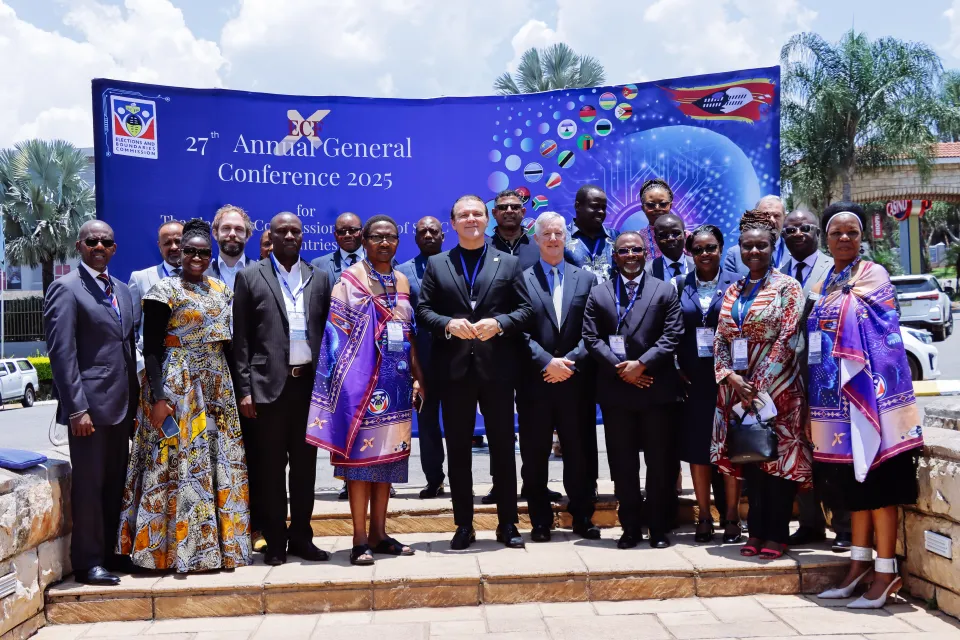Reflections on the global response to the challenges posed by social media to democratic and electoral processes

There is no neat, one-size-fits-all global solution to the challenges posed by social media to electoral processes. Disinformation and polarising political views, undermining public trust, a lack of accountability and public scrutiny, personal data privacy, money in politics, foreign interference—these are just some of the issues that demand immediate international attention.
Disclaimer: Views expressed in this commentary are those of the staff member. This commentary is independent of specific national or political interests. Views expressed do not necessarily represent the institutional position of International IDEA, its Board of Advisers or its Council of Member States.
While Facebook has received the most scrutiny since 2016, each social media network poses its own set of challenges, such as WhatsApp’s end-to-end encryption which prevents even the company itself viewing users’ messages. Furthermore, legislation and policy developed in one country cannot simply be lifted verbatim and applied to another country. Concerns have already surfaced that the legislation being developed in stable democratic countries to prevent ‘disinformation’ could be adopted by authoritarian governments to legitimise the suppression of free speech. It is, nonetheless, possible to identify several over-arching features that the international response has, and must continue to involve:
1. International and regional dialogues informing national action
National legislators, electoral management bodies (EMBs), media and civil society organizations can draw upon the wealth of ideas and solutions being generated from academic and practitioner conferences, round-tables and special commissions worldwide.
In June, International IDEA convened a roundtable in the Hague on the use of digital micro-targeting by political parties in elections. It emerged from the discussion that, while no one solution could satisfy the conditions and legal framework of all countries, a common set of international principles could provide a base for national actors to build legislation upon. It was also suggested that existing multi-national legislation, such as the EU’s General Data Protection Regulation (GDPR) could be built upon and tailored more specifically to electoral processes.
In their recent publication Social Media, Disinformation and Electoral Integrity, the International Foundation for Electoral Systems’ (IFES) suggested that a key role of INGOs should be to assist national EMBs, civil society organizations and legislators to strategize and implement plans to mitigate the negative influences of social media on their elections. Thus, for INGOs like IFES and International IDEA, a central responsibility is both to contribute to this global dialogue on social media and elections, but also to interpret the global stream of ideas coming from multi-national organizations and national states and assist EMBs in applying these ideas to their own national circumstances.
2. Policy discussions and solutions that incorporate all stakeholders in electoral processes
Headline-grabbing policies such as regulating Facebook can only be part of the response. It is necessary to develop a multi-dimensional approach that seeks to answer the question: How can each of the stakeholders in the electoral process contribute to promoting electoral integrity in relation to social media? As has been stated by the Kofi Annan Commission on Elections and Democracy in the Digital Age, this will involve bringing together ‘agents of reform’: other social networks such as Whatsapp and Twitter, ‘data-brokers’ on the model of Cambridge Analytica, governments and political campaigners, EMBs and, of course, the electorate.
One of the primary ongoing international debates on this subject is the question of who is responsible for regulating the content of social media platforms and how far they can go: Should it be national states or the social media companies themselves? How can disinformation and hate speech be combatted without compromising the fundamental right to free speech?
Any solution to the challenges posed by social media to electoral processes will necessarily involve a degree of co-operation and collaboration between state agencies and social media companies. A strong state regulatory role would provide a level of transparency and public accountability that, as the Cambridge Analytica scandal demonstrated, was lacking when the social media companies were left to their own devices. On the other hand, self-regulation could be more flexible and could encourage social media companies to actively engage in providing solutions to the challenges that their technology has created.
Facilitating networks and connections for such co-operation is another crucial area where INGOs such as International IDEA can be of assistance to national EMBs and regulators. One model that has been utilised recently is a voluntary code of ethics for social media companies to agree to, such as the EU Code of Practice on Disinformation or the code agreed between the Electoral Commission of India (ECI) and leading social media companies before the March 2019 election.
Solutions that involve EMBs and the electorate could include voter education to encourage critical thinking skills and media literacy, so that voters are able to detect and dismiss disinformation. Furthermore, EMBs can use their own social media presence and credibility to fact check and ‘myth-bust’.
3. Inter-agency collaboration within and across borders
Given that social media companies such as Facebook and ‘data-brokers’ such as Cambridge Analytica and nation states operate globally outside of the countries where they are based, any regulatory response to social media will necessarily involve co-ordination between state agencies within and across national borders.
In July, International IDEA published the guide, Cybersecurity in Elections: Models of Interagency Collaboration, which charts how channels of communication and co-operation between EMBs, security agencies and cyber-security expert bodies have developed in 20 countries. There is a parallel need for the establishment of channels of communication for approaching the information that is circulating within the system, as well as the security of the system itself.
4. A focus on developing the positive influences of social media and technology on democratic, as well as mitigating the negatives
The reality is that social media platforms are going nowhere. A decade ago, in the context of the Arab uprisings and election of Barack Obama, social media platforms were hailed for brining marginalised groups into political life and allowing easier civilian organization. Amid global debates on regulation, it is crucial that suitable resources remain devoted to tapping into the positive influences that social media can have on democratic processes.
The Design for Democracy Coalition (D4D) is an important force for moving debates over social media and elections away from purely damage limitation and towards a more optimistic vision for how social media could ‘play a proactive role in supporting democracy and human rights globally’. In 2018, for example, they established Democratic Principles for an Open Internet to enable activists to operate with a better understanding of digital rights.
The work of the Independent Electoral and Boundaries Commission (IEBC) on the Kenyan election in 2018, in collaboration with IFES, demonstrates how EMBs can utilise social media platforms to promote truth and counter disinformation. A ‘Now You Know’ brand was developed on social media to distribute Myth buster ads, in order to quell emerging and potential rumours and misinformation circulating.




